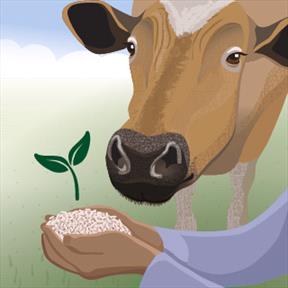FDA feed

When it comes to good-for-the-environment claims and other purported benefits of products fed to animals, where should the line be drawn between foods and drugs? That's the central question of an upcoming public listening session hosted by the U.S. Food and Drug Administration.
The agency wants input on whether its policy "Regulating Animal Food with Drug Claims" should be updated and, if so, how, in light of scientific advances that have taken place since the policy was established in 1998.
The online event takes place Oct. 18 at 10 a.m. EDT. Participation is free but requires registering by Oct. 11.
Among the developments regulators say they are starting to see are products that claim to benefit the environment; products with claims about supporting the microbiome; and products said to spur livestock to grow faster or, in the case of dairy animals, produce more milk.
Under the existing policy, foods that claim to have an effect on an animal's body structure or biological function are usually regulated as drugs. The FDA is trying to determine whether that's still appropriate.
Since the policy was set 25 years ago, "the science has changed a lot," said David Edwards, director of the Division of Animal Food Ingredients in the FDA Center for Veterinary Medicine (CVM) Office of Surveillance and Compliance. "We know a lot more about how things act in the body of an animal. ... Twenty-five years ago, we might not have had the genomic tools we have today to look at what might be in the DNA of [a] substance. ... We are in a different space today in terms of the scientific review that can be done for some of these substances than we were in 1998."
Obtaining FDA approval for a drug is a complex and extensive process. Foods do not require approval before being marketed. Food additives require approval, but that process generally tends to be less complicated than for drugs.
Congress last year requested that the FDA review its policy on animal food claims. "It asked us ... to see if we could increase regulatory flexibility, promote innovation and reflect advances in science for animal drugs and food ingredients," Edwards explained in an interview.
Crystal Groesbeck, director of the FDA CVM's Division of New Animal Drugs in the Office of New Animal Drug Evaluation, pointed to a new drug called Experior as an example of an innovative product.
Approved in 2018, Experior is designed to reduce ammonia gases in cattle manure when administered under particular circumstances. The label indicates use in "beef steers and heifers fed in confinement for slaughter during the last 14 to 91 days on feed." The over-the-counter drug produced by Elanco comes in a granular form that is mixed into cattle feed.
Ammonia contributes to air and water pollution and irritates the eyes, nose and throat in people and other animals when present in high concentrations.
Experior is controversial. Animal Legal Defense Fund and other plaintiffs are suing the FDA over its approval of the drug, alleging that the agency had insufficient information to determine that it is safe for animals and consumers. The case is filed in the U.S. District Court for the Northern District of California.
According to an FDA news release in 2018, "Multiple studies showed that Experior is safe to feed to beef cattle and that meat from cattle treated with Experior is safe for people to eat. More than 4,000 cattle were studied, and the results showed a low incidence of health issues overall, and no difference between control animals and those receiving Experior."
In general, the development of products involving "environmental-benefit-type claims" is drawing high interest, Groesbeck said. There's also high interest in products that promote the growth and productivity of livestock, she said.
The use of antibiotics to hasten food animals' growth has been restricted in recent years, owing to concerns about evolving drug resistance in pathogens. But FDA officials say interest in foods that promote growth predates the restrictions.
A third category drawing high interest is the use of "viable microorganisms" in animal feed or pet food, presumably to boost populations of beneficial microbes in the gut. Asked what form such products would come in, Edwards said, "It could be in a kibble." He added that livestock often are already fed microorganisms as part of their rations. "There are lots of different applications," he said.
Two subjects that likely won't be addressed in the FDA listening session on health claims in animal foods are therapeutic diets for pets; and cannabidiol and hemp. Those are complicated topics that Edwards said constitute "their own categories."